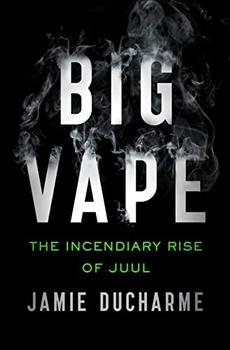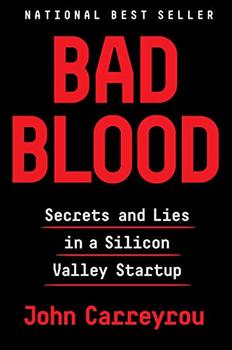Summary | Excerpt | Reviews | Beyond the book | Read-Alikes | Genres & Themes | Author Bio

The Incendiary Rise of Juul
by Jamie DucharmeIn Big Vape, TIME reporter Jamie Ducharme studies the short but inflammatory history of Juul. Her comprehensive report, replete with testimonies and research, probes to what extent the company is responsible for widespread underage vaping. In the process she uncovers mistakes, recklessness and corporate greed, building up a picture of a business that, in many cases, prioritized profits over people.
The story of Juul begins like a familiar Silicon Valley success tale. In 2004, Adam Bowen and James Monsees, two bright but inexperienced young graduates, had an idea: to create a sophisticated, techy alternative to traditional smoking. After years of struggle and hard work perfecting their product, it catapulted them into stratospheric success. Had the story finished there, it would have had a happy ending. But when Juuls began showing up in high school classrooms, the company found itself faced with accusations that its marketing choices were to blame. This, coupled with the later appearance of a "cluster of pulmonary illnesses" linked to e-cigarette use, has put the company's future in serious doubt. Ducharme's timely investigation unspools how Juul reached this point of crisis, while also drawing attention to the perils of unregulated industry.
The style of Big Vape will be familiar to readers of quality investigative journalism. Ducharme writes in a level-headed, even tone, carefully weighing up her findings as though they were evidence presented in court. She allows for the possibility that in the early days Juul was not so much malicious as simply irresponsible. However, while Bowen and Monsees never actively sought out an underage demographic for their product, the colorful, aspirational aesthetic of Juul's early media campaigns makes its take-up by teenagers seem almost inevitable. Despite multiple warnings that their branding would attract the underage, the company — and Monsees in particular — refused to alter Juul's image. Ducharme's analysis suggests that the spread of teenage vaping could have been avoided, and that Juul is at least partly culpable for a whole new generation of nicotine-addicted young people.
Later, as the company continued to engorge, Bowen and Monsees faded into the shadows. They ceded control to a successive string of CEOs, whose appointments were based on their ability to make profits for the company's cabal of investors. Ducharme presents this trajectory with cool restraint, illustrating her findings with statements from staff who joined the company early on. When Juul struck up a partnership with Altria, one of the world's largest producers of tobacco, many saw it as an act of moral turpitude. They were quickly proven right. The company's growing obsession with profitability, combined with its overtly cozy relationship with the larger tobacco industry, made for some sleazy salesmanship indeed. Juul's attempt at a school outreach program was particularly obscene. Though ostensibly designed to dissuade teenagers from vaping, the program seemed instead to subtly imply the superiority of Juul over other products — a move ripped straight from the playbook of Big Tobacco.
Ducharme also studies the difficulty that a lumbering bureaucratic behemoth like the Food and Drug Administration has in regulating new technologies. Though the relationship between Juul and the FDA was combative from the start, the organization could not move fast enough to control Juul's practices. Early on, this allowed Bowen and Monsees to freely experiment with their formula and testing practices, veering into ethically sticky territory. Later, it resulted in serious concerns that the long-term effects of vaping were little understood.
The hubristic desire for progress, consequences be damned, is very much a theme of our times, and in Juul's case the repercussions are still unfolding. Now facing hundreds of lawsuits due to its product's possible link to pulmonary disease, the company should serve as a cautionary tale against the relentless pursuit of profit at the cost of safety. Well-crafted and painstakingly researched, Big Vape is an engrossing case study of the dangers of unregulated corporate growth.
![]() This review was originally published in The BookBrowse Review in July 2021, and has been updated for the
June 2022 edition.
Click here to go to this issue.
This review was originally published in The BookBrowse Review in July 2021, and has been updated for the
June 2022 edition.
Click here to go to this issue.

If you liked Big Vape, try these:

by Sophie Gilbert
Published 2025
From Atlantic critic and Pulitzer Prize finalist Sophie Gilbert, a blazing critique of early aughts pop culture.

by John Carreyrou
Published 2020
The full inside story of the breathtaking rise and shocking collapse of Theranos, the multibillion-dollar biotech startup, by the prize-winning journalist who first broke the story and pursued it to the end, despite pressure from its charismatic CEO and threats by her lawyers.
Your guide toexceptional books
BookBrowse seeks out and recommends the best in contemporary fiction and nonfiction—books that not only engage and entertain but also deepen our understanding of ourselves and the world around us.